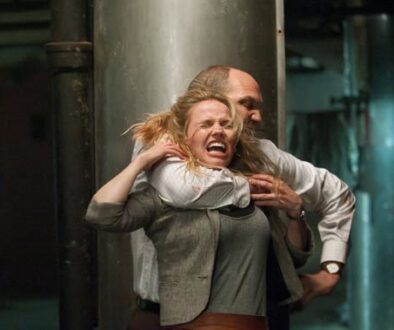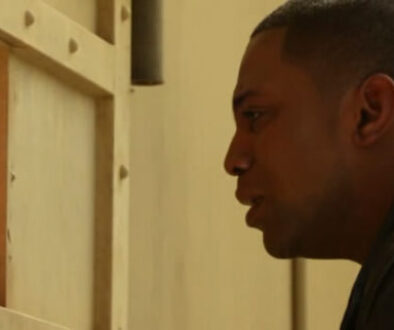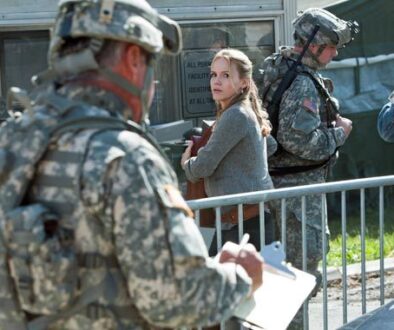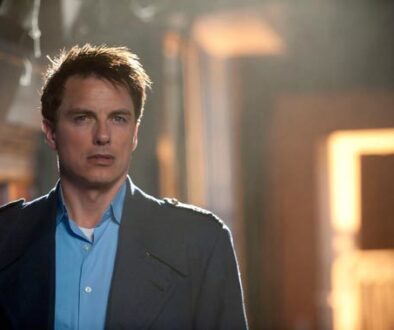Torchwood: Miracle Day Episode 5 Review

Clint Hassell reviews The Categories of Life, the fifth episode of Torchwood: Miracle Day.
Every week, I watch the new episode of Torchwood: Miracle Day twice. The first time, I watch the episode straight through, enjoying it as a fan, pausing only to scrawl ideas for the cheeky (and sometimes playfully misleading or oblique) teasers I post on Saturday mornings. After I spend a couple of days ruminating over the events of the episode, I watch it again, pausing often to write detailed notes that will help me craft an engaging critical review. This second viewing often takes more than two hours, and leaves me with several pages of writing that includes my stream-of-consciousness thoughts while watching the show, exact quotes I am thinking of including in my review, basic plot points to help me orient myself within the story’s narrative, and pertinent information like the exact spelling of a character’s name.
After this week’s episode, “The Categories of Life,” I was left with but one page of notes. Mind you, I wrote on the front and the back of the page – and I write really small – but, overall, that one page is between one-third and one-fifth of the notes I normally take. More surprising, this week, there was little running commentary and almost no plot outline, just . . . questions. Not the kind of deep, thoughtful questions like the show is asking us to consider (“What would happen in a world with no death?” “What decisions would I make?”). Not the plot-oriented questions about which we’re all wondering (“Who is behind the ‘miracle’?” “What will happen to Rex when the ‘miracle’ is reversed?”). Not the oblique questions that only anal-retentive – er, I mean, “super-involved” – fanboys like me ask (“How does the ’miracle’ affect Ian and Barbara?” “Where are Trinity Wells and Martha Smith-Jones?”). Heck, not even questions asked when someone makes EDTA in a coffeepot, using airplane degreaser (“Are they fu@#ing kidding me?!”). No, these are the type of questions that, when read collectively, give me the uneasy feeling that this episode doesn’t make a whole lot of sense, as if the scriptwriters forgot which of the many leads were meant to be red herrings and followed each emerging theory and plot device with equal conviction.
For example, in the opening teaser, why is Dr. Juarez so upset when she learns that the government has established three categories of life? Yes, the government has redefined “life” and “death” as “alive-and-healthy,” “should-be-dead-but-for-the-‘miracle,’” and “wait-and-see” – but the government did that on the advice of the medical panels of which Vera herself was involved. And, wasn’t that the purpose of the medical panels – to investigate the new scientific parameters of post-“miracle” existence and meld them with ethics? (Modern medicine is, in fact, the combination of science and ethics, which is why doctors are so respected in our society.) So, why is Vera livid? Does she consider the categories to be incorrect or unfair? Does she not realize that these categories are practiced by healthcare professionals on a daily basis? Every paramedic that chooses to treat first the critical-but-salvageable accident victims, every dentist that extracts a tooth rather than placing a filling, every doctor that terminates life support on a comatose patient – all are choosing who receives treatment based on who is most likely to positively benefit as a direct result of that treatment. It’s a concept called triage, and, as a doctor in an emergency room, Dr. Juarez should be very comfortable with the idea.
Why is Arlene Tur not listed in the opening credits? Dr. Juarez has been just as pivotal to the plot as any other character – even more so than Oswald Danes – and has, in fact, been the tool the scriptwriters have used most often to get the audience to consider how the “miracle” would change our healthcare systems. Despite the brilliantly-enigmatic Jilly Kitzinger, it is entirely possible that the stand out character from Miracle Day may be Dr. Juarez. So, why do I feel like Arlene Tur is not getting the credit she deserves? (And, it is at this point that I realized that – spoiler alert – Juarez was not long for this show, as, in the U.S. at least, the Screen Actor’s Guild requires that cast members contracted for an entire season of a series always receive star billing in the opening credits. Guest stars do not receive the same status, therefore, it was obvious that Juarez would not appear in every episode [i.e., Lauren Ambrose as Jilly Kitzinger or Tom Price as Sergeant Andy]. Since her character had played such a major role in the series thus far, she seemed the obvious sacrificial lamb. That’s not to say that I will be surprised if Rex and Mr. Cooper also die in the finale – more on that in a bit.)
How are we already at the point that the healthcare systems are breaking down? It’s only been two or three weeks since the “miracle” occurred. Yes, the effects of the “miracle” will initially place a strain on emergency rooms as should-be-dead trauma victims begin to pile up. Six months post-“miracle” will bring another healthcare crisis as the previously-mentioned pregnancies that should have spontaneously aborted in the first trimester due to genetic anomalies come to term. Months later and the undying elderly will begin to crowd nursing homes. But this should lead to the reallocation of resources (say, for example, restricting emergency rooms visits to truly injured – as opposed to ill or simply uninsured – patients, or, the opening of new nursing homes), and not to rioting in the streets. Look at it in this way: in the past two or three weeks, how many people do you know personally that have died? Thankfully, the vast majority of us will not be able to name anyone. To portray the healthcare system as already at the breaking point seems a bit of a stretch. Considering that this is a television show, I can understand this storytelling cheat, however . . . .
. . . Am I supposed to believe that we already have the secretive, systematic, government-sanctioned executions of all Category 1 patients? A more-likely scenario would be for governments to first use public education and then ever-stricter sanctions to limit the number of babies being born (China is already using these measures to limit their real-life overpopulation problem, and I love that Miracle Day refers to China as therefore being able to refuse the overflow camps.) Next, governments would begin allowing volunteers to be humanely anesthetized and then cremated. Remember, despite the “miracle,” people still age; it is not unfeasible that, facing ever-increasing incapacity due to frailness and senility, the elderly would begin to welcome the release of cremation. Eventually, these measures would fail – as long as there is beer, there will always be unplanned pregnancies – and the world’s resources would begin to be taxed. Even then, forced executions would be years away. First, wars would break out in the undeveloped countries most affected by famine. Economies would strain as more and more people were burdened with caring for ever-aging parents now living at home. Fringe scientists would suggest cremations and be discredited. Civil unrest would become more common in developed countries as tensions mount over the availability of resources. A politician would revisit the idea of executions and be voted out of office. A public debate would rage, and still, executions would not occur. Governments would splinter and martial law would prevail before the public would be forced to make the collective decision that, for the survival of the species, some of the population needed to be forcibly removed. (And even then, it is much more likely that forced abortions would prevail, since, as some would argue, a potential life has less value . . . but you can’t produce a show about killing babies – not even in America.) For executions to occur without public knowledge is ludicrous, if for no other reason than the fact that thousands of people (politicians, bureaucrats, construction workers, etc.) would need to be involved to execute such a plan and someone, somewhere would leak the secret. Heck, I can’t post a list of Miracle Day teasers without someone over-explaining them into a list total spoilers, so imagine what a morally-outraged person could do with, say, an intra-office memo regarding the modules and a Facebook page, or a set of overflow camp schematics and a YouTube account.
“But Clint,” you argue, “secret, forced executions have occurred in our recent history.” True, and Miracle Day is certainly going out of its way to draw a parallel between the overflow camps and the Nazi concentration camps. However, I would argue that such situations occur when there is tension between two different ethnic groups (the Tutsi and the Hutu in Rwanda, for example), and not when people are forced to pick members from within their own culture. More importantly, I would make the claim that the travesties of World War II will never happen again because they have already occurred, and the world recoiled at the horror. Isn’t the true, lasting legacy of the Holocaust that the world is now educated and aware enough that it can not happen again? For Miracle Day to assume that, within weeks of the “miracle,” mankind’s first instinct is to push the weak and the frail into ovens is to assume that every politician, every medical worker, every bureaucrat – in fact, most of society at large – is ignorant of history and morally bankrupt. I feel that to be an oversimplification.
Why does Esther think she is “useless”? That question seems to come from nowhere. In fact, that entire scene seems to accomplish nothing except for Jack to NOT tell Esther his backstory yet again – a running gag that has become tiresome.
Why is Danes so clueless as to his role in PhiCorp’s plan? Of course, he is being used – and, of course, PhiCorp isn’t going to tell him that – – but it’s a terrible trope that they are investing so many resources into promoting him, and yet no one has informed him that his job will be to appear at public functions and to memorize and recite PhiCorp’s pre-written speeches. If Oswald is so important, why is Jilly always leaving him alone? Wasn’t she assigned to be by his side? Or is this just her hating him (which, again, feels off)?
Speaking of Jilly, what is the deal with her? Suddenly, she’s not wearing red, and she’s barely keeping it together. There has always been something otherworldly about Ms. Kitzinger – a little devilish, a little too in-the-know – but now, she’s just randomly high-strung and nuts. Lauren Ambrose is too good of an actress for this to occur without purpose, so, what is she conveying? Or is this bad direction? (And while we’re on the subject – who is she yelling at on the phone? If it is an assistant, then where is he?)

Are we really supposed to take the character of overflow camp supervisor Colin Maloney seriously? The character is horribly written; in the span of 28 minutes he manages to be racist, sexist, inappropriately sexual, greedy, a starf***er, uncouth, uncaring, unethical, misguided, violent, and vile. He’s so many clichés crammed into one persona that, even if Marc Vann were a capable actor (which, wow, he is not), there would still not be enough substance for Vann to utilize in fleshing out a real character. I don’t mind not liking characters, however, I hate Maloney, not because he is evil, but because he is poorly-written and poorly-acted. That’s a problem. The entire third act where Vera is shot and Colin and Ralph hide her body in a module is ridiculous, with Ralph barely keeping it together, and Colin completely falling apart. Ralph is stupid beyond words. He wouldn’t say anything? Come on – the U.S. Army is founded upon seven core values, and Ralph’s actions violate four of them, including duty, respect, honor, and integrity. Sure, not every officer is a shining example of the Army’s values, but, honestly, we’re to believe that Ralph would just let Colin dictate that he become an accomplice to murder?
Why don’t Esther and Rex get cover aliases like “Owen Harper/John Smith” or “Yvonne Pallister”? Weren’t they framed for treason by the CIA? How could Esther use her CIA analyst credentials to get hired as a clerical worker in the overflow camp?
So, it is obvious from comments in “The New World” and in this episode that Gwen has told her parents about the Torchwood Institute. Did she do it because, with the Hub destroyed, Jack seemingly off-planet, and Ianto dead, there no longer seemed to be a need to cover Torchwood’s secrets? Can you imagine how that conversation went, especially since Gwen couldn’t use the apparent Torchwood Three initiation technique of playing “seven minutes in heaven” with a Weevil in the Hub’s cell? (And I have to wonder – did she mention Retcon-ing all of the guests, including her parents, at her wedding?)
On the subject of Mr. Cooper: he’s awake, he recognizes his daughter, and is lucid enough to have an intelligent conversation with her . . . and then he walks 60 steps and has a heart attack? Since episode one, Miracle Day has foreshadowed that Mr. Cooper would die, but, man, does this confirm it!
Colin claims that the people he was hiding from Dr. Juarez in the overflow camp were receiving no care because they had no insurance. Wouldn’t the insurance of all of the Category 1 patients also be cancelled, since, by definition, the “miracle” could be classified as an “Act of God”?
And, really, why don’t these people get the hell up? Many of them don’t look incapacitated – they look sick (and maybe a little cranky). Get out of bed! Walk around the hospital or the camp and become an annoyance until you receive some care! Hey you, old woman complaining that she is cold – get your own damn blanket! Lyn had her neck broken and she was still wandering around being a total nuisance. Again, the complacency of everyone in society to just let appalling things happen in the wake of the “miracle” is completely unbelievable.
And, finally, – and this approaches the making-EDTA-on-a-plane level of unbelievability – how is it that Gwen and Rhys can get caught trying to smuggle a Category 1 patient out of an overflow camp and they don’t get arrested? It’s lunacy!
Don’t mistake: I actually enjoyed this episode. As a whole it flowed better and moved the story forward in a much better way than, say, “Rendition.” I appreciate the scope of the allegory Russell T Davies is trying to create.
Specific highlights for me:
Seeing Rhys in a suit and a driver’s cap. Oh my God, that scene was hot. I love that, despite the stress placed on their relationship by Torchwood, Rhys and Gwen are still playful and clever. Inventiveness in a relationship is sexy. I do wonder, though, whose idea was that bit of role play. It wasn’t a necessary cover devised by Gwen – because she kisses her “driver” publicly – so it must have been a surprise from Rhys, which kinda makes sense, considering he is a truck driver. Regardless, I am so asking for a driver’s cap for Christmas now!
I love that, even though he is only in one brief scene, Sergeant Andy’s character shines. “Well, it’s nice to have you back,” he admits to Gwen, as if she could ever return to Cardiff as his partner after all she has accomplished in Torchwood. How endearing was it when he tried to use his “authority” to rescue Mr. Cooper from the overflow camp?
I haven’t mentioned it before (because the shows does more than enough to point it out), but Esther obviously has some unrequited feeling for Rex. I did love her hesitation in placing a red peg on his lapel. “Keep that, in case you need to change categories,” she said, insisting he hold onto the blue Category 2 peg. Please, please, dear writers, let this pay off in a later episode!
I love that it was the previously-seedy, former unethical con man Jack that urges Oswald to be a hero. You want your connection to Doctor Who? This is it, as Jack’s speech to Oswald to overcome his past and become a hero in helping others mirrors the message that Nine helped Jack to embrace in Series 1. Also, I appreciated the final scene where Oswald delivers his “revelation” speech; there is a beautiful shot of Danes, speaking into the darkness, flanked by spotlights, each symbolizing either PhiCorp or Jack, the two forces pulling him in differing directions.
I love when characters are sensible and resourceful, so when Jilly snapped Jack’s photo with her camera phone, I squeed a little on the inside, knowing that will definitely be revisited in the future.
I both loved and hated that Rhys had driven Category 1 patients to the “burn center” (actually a module where the patients will be incinerated) because, while it links our three core Torchwood characters together – now Jack, Gwen, and Rhys have all been directly responsible for an innocent person’s death – it is not how I wanted to see Rhys further tied into the show’s mythology. We’ve studied closely Jack and Gwen, looking for their breaking point; will we begin to see signs of Rhys’ in the future? Was his role as family leader in “The New World” to counter later developments in his character?








